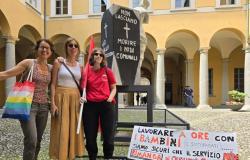
In the first three months of 2024, the Piedmont region witnessed the disappearance of as many as 786 retail businesses, a worrying figure that marks an increase of around 80 units compared to the same period of the previous year. This alarming statistic was communicated by Confesercenti, which speaks of a “collapse” of neighborhood commerce, a phenomenon parallel to the unstoppable growth of online purchases, estimated at +13% for the course of the year. The comment by the president of Confesercenti Piemonte, Giancarlo Banchieri, is clear: “The crisis in neighborhood trade does not stop”.
Banchieri underlines a crucial aspect: “The exchange between shop windows and parcels is not at par for the economies of the territories”. With the migration of purchases to international e-commerce platforms, which often pay taxes in other countries, the tax revenue generated by local shops collapses, with serious repercussions for local and national economies.
The trade situation in Piedmont: a profound crisis
In the period between January and March 2024, 1,380 business closures were recorded compared to only 594 new openings. This negative trend is part of an equally bleak ten-year context: in the last ten years, the number of neighborhood shops has dropped by 15%, with a decrease that doubles in the newsstands and clothing sector.
Given this decrease, online shopping deliveries have grown exponentially, going from approximately 75 million in 2013 to an expected total of 734 million in 2024 nationwide.
The fiscal impact of this transformation is equally significant. According to data from Confesercenti, the cumulative loss for the Italian tax authorities is around 5.2 billion euros in missing revenue. This nuanced revenue includes 17.4% (910 million euros) of IMU, 12.6% (660 million euros) of TARI, 42.7% (2.24 billion euros) of IRPEF, as well as 223 million euros (4.3%) of additional regional and municipal IRPEF, 700 million euros of IRAP (13.4%) and 510 million euros of other municipal taxes (9.7%).
READ ALSO ▷ Tax Reform 2024 New Guidelines on Taxation: read now how to apply preferential taxation
These numbers not only highlight an economic problem but also raise social and urban concerns. The closure of neighborhood shops profoundly alters the liveability of cities, transforming them into places increasingly dominated by home delivery vehicles. This change involves a loss in terms of quality of life and social cohesion, fundamental elements for the well-being of local communities.
The request for political intervention: a sector to be protected
The president of Confesercenti Piemonte, Giancarlo Banchieri, has repeatedly raised alarms regarding the critical situation of neighborhood trade in the region. He underlines that “in ten years, openings in our region have dropped by 70%, compared to a national figure of 54%”. This dramatic reality, according to Banchieri, requires urgent interventions to prevent openings from being reduced to just under 1,000 in Piedmont by 2030.
Banchieri proposes that neighborhood trading be considered a “protected sector” similar to how the European Union protects agriculture. He argues that European funds should also be allocated to small businesses, to support these activities that are fundamental to the economic and social fabric of local communities. Furthermore, Banchieri draws attention to the need for measures that put an end to the unacceptable preferential treatments enjoyed by large web platforms, guaranteeing equal tax conditions and compliance with the rules protecting competition.
The upcoming regional and European elections represent a crucial opportunity to address these issues. Banchieri asks all political parties for a concrete commitment to implement the necessary measures to support local trade.
READ ALSO ▷ Could the Meloni Government’s tax agreement facilitate tax evasion? Find out the truth.
He underlines the importance of moving from statements of principle to concrete and operational interventions, which can truly reverse the negative trend and safeguard the future of neighborhood shops.
E-commerce and the transformation of trade: a global challenge
The exponential growth of online shopping is not a phenomenon limited to Piedmont or Italy, but reflects a global trend that is radically transforming the way people shop. E-commerce platforms offer unprecedented convenience, allowing consumers to purchase products from anywhere in the world with just a few clicks. However, this convenience comes at a significant cost to local economies.
Large e-commerce platforms, such as Amazon and Alibaba, have benefited from often favorable tax treatment, exploiting gaps in international regulations to minimize tax payments in the countries in which they operate.
This has led to unfair competition with local shops, which cannot compete with the low prices offered by online giants, who often manage to avoid paying a fair share of taxes.
In response to this challenge, it is essential that national governments and international institutions work together to create a fairer regulatory framework that requires e-commerce platforms to pay taxes in the countries where they generate their revenues. This would not only level the playing field for local merchants, but would also help ensure that tax revenues stay in the communities where they are generated, thus supporting local public services and infrastructure.
READ ALSO ▷ ECB rate cut: the fight breaks out which puts economic growth in the Eurozone at risk.
Furthermore, it is essential to promote innovation and digitalisation among neighborhood shops, helping them to exploit new technologies to improve their competitiveness. Training programs and technological support can help small merchants develop an effective online presence, integrating traditional sales channels with digital ones. This hybrid approach could offer neighborhood stores greater resilience and the ability to adapt to new consumer habits.
No hope, just an uncertain but possible future
The future of neighborhood commerce in Piedmont and throughout Italy depends on a combination of political interventions, technological innovation and a change in consumption habits. As e-commerce continues to grow, it is essential to find a balance that allows local shops to thrive and contribute to the economy and well-being of communities.
The upcoming elections represent a crucial opportunity to put these issues at the center of the political debate and to commit to the necessary reforms. The creation of a fair regulatory framework and direct support for neighborhood trade can make the difference, ensuring that Italian cities do not become simple delivery hubs, but remain lively and vital places, full of local commercial activities.
The challenge is to create a future in which neighborhood commerce and e-commerce can coexist and thrive, both contributing to economic growth and social well-being. The road is long and complex, but with commitment and political will, it is possible to build a sustainable and inclusive development model for Italian trade.




